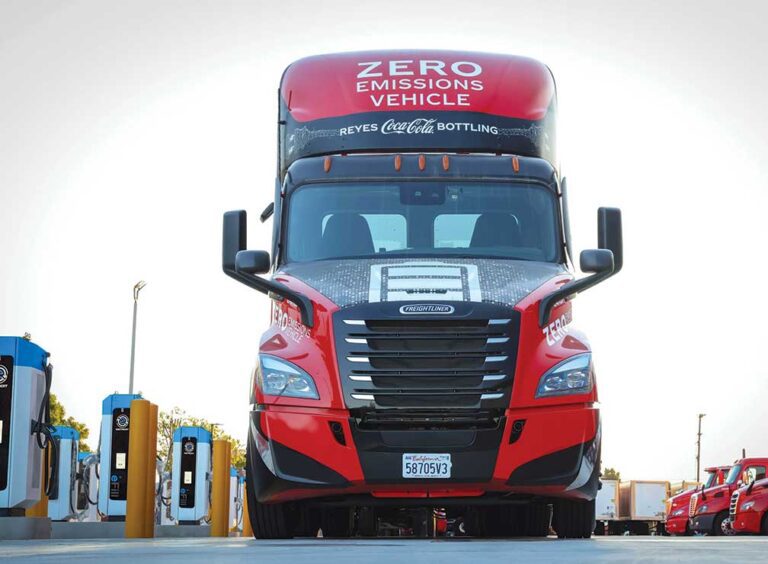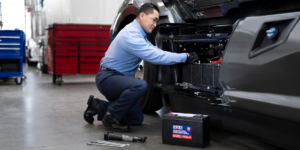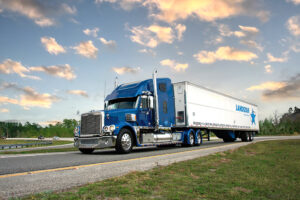A number of battles in the global fight to clean up the air are taking place in the trenches of the trucking industry.
Electric trucks are now a familiar sight on the sales lots, with most manufacturers now producing electric or hybrid-electric models. Some major motor carriers, such as J.B. Hunt, Walmart, and FedEx, have already begun incorporating electric trucks into their fleets. At this point, electric trucks are primarily used in final-mile, drayage, and yard tractor applications.
As individual states, along with the federal government, adopt stricter environmental laws targeting emissions, pressure is mounting for the trucking industry to convert to electric rigs.
But are electric trucks feasible for an industry that has, for more than 100 years, relied on diesel fuel to power its freight carriers?
“As an industry, we continually strive to make the environment a better one for those that will inherit it,” said Dave Heller, senior vice president of safety and government affairs for the Truckload Carriers Association (TCA). “The evidence of the achievements our industry has already accomplished has demonstrated exactly that.”
Heller says that as the trucking industry’s essential role in the world’s economy continues to grow, its environmental footprint continues to shrink.
“Truck engines manufactured today emit 98% less nitrogen oxide and particulate matter than those built 35 years ago,” he said. “In fact, it takes 60 of today’s trucks to emit what just one truck emitted in 1988.
“The long-haul trucking sector has been developed based upon centuries of technological advancements that have gotten us to where we are today,” he continued. “It would be irresponsible of us to think that a diesel replacement won’t take just as long.”
Heller notes that states that are already adopting strict environmental laws requiring new trucks to meet idealistic environmental guidelines are not being realistic.
“The reality is that as aggressive as these timelines are, we just are not there as a nation,” he said. “Electricity has shown tremendous promise, but today, it cannot replace the impact that the diesel engine has in serving the U.S. economy.
“A rush to replace it would serve as shortsighted and irresponsible, at a time when the needs of the national freight system are so paramount,” he continued.
For one thing, the nation’s power grid is not prepared to handle widespread adoption of electric vehicles.
“It’s not news that our nation is not generating enough electricity at this point to justify a changeover, nor are there enough charging stations to accommodate that change,” Heller said. “Creating a timeline that includes unrealistic deadlines will only amount to more problems that the unintended consequences of these kind of rules that almost always follows them.”
Heller isn’t the only industry leader concerned about the issue of electrification and emissions standards.
During the Arkansas Trucking Association’s 2023 annual conference, American Trucking Association President and CEO Chris Spear told attendees that it’s time to “turn up the volume and let our story be heard” when it comes to stricter emissions standards.”
The third phase of the Environmental Protection Agency’s (EPA) Clean Trucks Plan has caused the issue of big rig emissions to boil over.
“Phase 3, on NOx, that’s the toughest stuff,” Spear said. “It’s like squeezing blood out of a rock.”
The Clean Trucks Plan calls for reducing production of diesel-fueled rigs and replacing them with vehicles powered by electricity or other alternative fuel sources in the coming years. In December 2022, the EPA finalized part of the plan that calls for cutting cut smog-and soot-forming emissions from new heavy-duty trucks beginning with model year 2027.
Like Heller, Spear contends the trucking industry has already made great strides in helping to reduce emissions on diesel engines.
“For 40 years, we have worked hand-in-glove with the SmartWay program with the EPA,” Spear said. “We have recognized carriers that have kept up with the latest environmentally friendly equipment.”
Spear added that the industry has “been through the process to ensure equipment on the market can withstand the pressures that drivers put them though and still deliver reductions for the environment.”
The ATA, he said, is “all in favor of clean air and water. That is not debatable. But in four decades, we have worked to pull 98.5% of harmful emissions out of the tailpipes of trucks you buy on the lots today.”
In short, says TCA’s Heller, electric trucks are not likely to become a majority player in the industry anytime soon.
“‘One day’ is, of course, the operative word, and that ‘one day’ may take a lifetime to fully achieve,” he said.
This article originally appeared in the January/February 2024 edition of Truckload Authority, the official publication of the Truckload Carriers Association.
Linda Garner-Bunch has been with The Trucker since 2020, picking up the reins as managing editor in 2022. Linda has nearly 40 years of experience in the publishing industry, covering topics from the trucking and automotive industry to employment, real estate, home decor, crafts, cooking, weddings, high school sports — you name it, she’s written about it. She is also an experienced photographer, designer and copy editor who has a heartfelt love for the trucking industry, from the driver’s seat to the C-suite.











